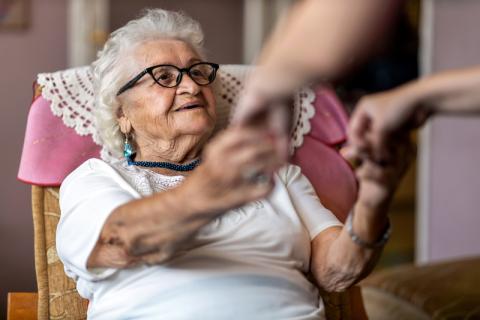
The team behind the VIVALDI study has found that protection given by the COVID-19 booster against infection with the virus lasts only three months for people in care homes who have not previously been infected. Protection against hospitalisation and death was longer lasting. They found that care home staff showed a similar pattern of declining booster effectiveness over time.
People in care homes have been disproportionately affected by the pandemic, with high vulnerability to infection and severe illness from COVID-19. As a result, they were prioritised for vaccination from December 2020 and then again for booster doses from September 2021, with a fourth dose for older residents from spring 2022
The VIVALDI study is a collaboration between researchers at UCL, care home provider Four Seasons Healthcare, and the Department of Health and Social Care. Its aim is to study patterns of COVID-19 infection and immunity among care home residents and staff.
The team wanted to find out how long protection from the booster vaccine lasts for this group, in particular against the Omicron variant currently in circulation. Their results are published in a preprint (and are therefore not yet peer reviewed).
The study recruited 14,000 residents of long-term care facilities in England, who underwent routine testing between December 2021 and March 2022. The researchers calculated the risk of COVID-19 infection, hospitalisation and death at 0-13, 14-48, 49-83 and 84 days after a third dose of vaccine, compared to the risk at 84 days or more after the second dose. They took into account whether someone had previously been infected, as well as age, sex, local rates of COVID-19 and how full the care home was.
They found that, in people who had not previously had COVID-19, the risk of infection was reduced for up to 83 days after the first booster. In contrast, no protection was detectable after 84 days. Protection against hospitalisation and death from COVID-19 also waned, but was still present beyond 84 days.
64% of the people in care homes who participated had received the AstraZeneca vaccine for their first two doses. This did not have an effect on their risk of infection, hospitalisation or death either before or after the booster.
The team also included almost 20,000 care home staff in the study, and they showed a similar pattern of waning booster effectiveness against infection, with few hospitalisations and no deaths.
The study team concluded that COVID-19 boosters offer sustained protection against severe illness following infection with the Omicron variant, but that this protection doesn’t last beyond three months.
They stressed the need for ongoing study of this group to further understand patterns of infection and immunity, in order to shape policies and measures to protect people in care homes.
